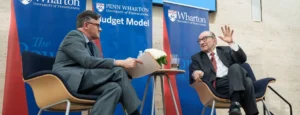Brittney Jean-Louis, WG’20, and Andrew Jean-Louis, WG’20, met as students at Dartmouth. After college, they married and began their careers.
Brittney focused her work on education. She said, “Education has the power to change lives. I’ve benefited directly from high-quality education while others in my community growing up weren’t as lucky. I chose the education industry because I wanted to give back to communities in need and be a part of unlocking the full potential of children living in under-resourced neighborhoods. I began my career as a math teacher and have since held various leadership positions in K-12 schools.”
Andrew began his career in management consulting and energy. “A trip to my parents’ home country of Haiti inspired me because I saw the lack of reliable electricity there. Working in the energy sector today is a direct result of that trip and has fueled my desire to make an impact in this space,” he said.

They both wanted an MBA, but with Andrew on the road four days a week as a consultant, the timing never seemed right. Andrew explained, “The thought of being away for work so much and then away for school on weekends was a difficult pill to swallow.”
However, they came up with a plan to make the timing work for both of them. “If we did an EMBA program together, then we would spend those weekends together and share the experience,” Andrew said.
The couple decided to come to Wharton’s EMBA program for its “quantitative focus, academic rigor, large network, resources, and caliber of faculty. When comparing Wharton to other MBA programs, it was clear that we’d get the most out of a Wharton MBA,” Andrew said.
Preparing for School
Going back to school together took some planning. While they were excited to come to Wharton, they also had a few concerns:
Household Planning
“It was a bit daunting to be away from work and home so much,” said Brittney. “However, we decided it was a worthwhile investment. To make it work, we had to do some problem-solving and outsourcing of home tasks like laundry, cooking, and cleaning.”
Coming from a Non-Quant Background
Another concern, noted Brittney, was her non-traditional background. Even though she taught high school math, including AP calculus, she was apprehensive about finance classes. That concern didn’t last long, as “the administration does a great job of reaching out and providing resources around content and tutoring. Knowing that was available — even if I didn’t always take advantage of it — was nice. Our classmates were also open and inviting. I always had people to talk to and bounce ideas off of, especially in classes that were new to me like Accounting and Finance,” she said.
Being Black Students in the EMBA Program

“It can be a bit scary to feel like you are the representative of a particular race or background, but the class was more diverse than we expected,” noted Andrew. “There were about a dozen Black and Latino students, as well as students from other countries. The WEMBA staff does a great job of making everyone feel included and welcomed. It’s a very positive environment and being Black wasn’t an issue.”
Brittney added, “We both attended predominantly white institutions in the past and are used to being among the few people of color in a large class. However, it is clear that the faculty at Wharton are trained in inclusivity. They make a point to be inclusive during class discussions, like using both male and female pronouns when referring to CEOs and using a variety of case studies.”
Making Friends Together and Apart
The couple also thought about how to make the most of the social experience. They decided the best strategy was to try to make friends individually – at least in the beginning.
“It was tempting to hang out together because we hadn’t seen each other all week, but we made a decision to not sit near each other in the beginning of the program. We wanted to meet as many classmates as possible” Brittney said.
Andrew added, “We were very intentional about trying to make friends on our own. Over time, our friends have merged, and we don’t think about where we sit anymore.”
Relying on Learning Teams

That strategy applied to their schoolwork as well. They learned while studying for the GMAT that they have different learning styles that didn’t always mesh. “Studying together wasn’t that productive,” Brittney joked. “In school, we relied on our learning teams more than each other.”
Looking back, the couple said that the program brought them closer together. “It’s challenging and exhausting because you want to perform at a high level in all the domains that you care about: family, work, and Wharton. Andrew and I knew first-hand how difficult it was to juggle all of our responsibilities; we leaned on each other for emotional support and understood what the other person was going through,” explained Brittney.
Impacting Careers
During the program, Brittney and Andrew both saw an impact on their careers.
Andrew explained, “I often sent my clients materials from Wharton. For example, I shared information from a course about developing culture and motivating people. I want my team at work to benefit from my experience in this program. The courses also helped me to advise clients on higher level topics such as aligning incentives, organizational strategy, and how to lead teams.”
He noted that Wharton has changed his perspective on the definition of ROI. “I used to think ROI was mostly financial, but I see now that it’s about what drives me in the workplace and how I am fulfilled. This program inspired me to create environments and systems in organizations that people want to be a part of. My experiences in the program have helped me become a better leader for my family, at work, and with friends. In these ways, the ROI is beyond financial.”
Recently promoted to a senior director at his company, Andrew is “looking forward to building long-term foundational clients and creating a healthy working environment for teams using frameworks from leadership classes, such as maintaining the elements of good job design, integrating the various domains of life, and facilitating intrinsic motivation.”
He’s also taken an active role in revisiting performance review relationships and processes with the goal of accelerating career growth for all consultants. And he is an active member in his company’s recently formed task force geared towards diversity, equity, inclusion, and accessibility.
Brittney’s career is also changing as a result of Wharton. When she started the EMBA program, she was the executive director of a charter school in Connecticut. However, with an interest in entrepreneurship, she was eager to launch something new. In the fall, she will join a fellowship to found an independent school in Houston.
“This wouldn’t have been an option – or would have been a lot more challenging — without having gone to Wharton. Knowing how to build a school is different from knowing how to run a school. Now, I have a network of people I can contact about anything. And I can apply knowledge from classes like managerial decision-making and data analytics. Knowledge from the human capital courses will help me create systems that motivate people to do their best work and align rewards systems to the goals of the organization,” she said. “There is also a level of prestige that comes with having Wharton on your resume. It helps people trust you to take on higher-level thinking and challenges.”
— By Meghan Laska
Posted: July 22, 2020





















